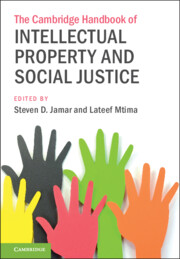Book contents
- The Cambridge Handbook of Intellectual Property and Social Justice
- The Cambridge Handbook of Intellectual Property and Social Justice
- Copyright page
- Dedication
- Contents
- About the Contributors
- Foreword
- Prolusion: What Is Intellectual Property (And Why Should You Care About It Anyway?) – A Layperson’s Guide to Intellectual Property Law
- Introduction: Intellectual Property Social Justice Theory: History, Development, and Description
- Part I IP Social Justice Foundations
- Part II IP Social Justice in Major Intellectual Property Domains
- Part III IP Social Justice: Historical Perspectives
- Part IV IP Social Justice in the Political Economy: Engaging Activism; Achieving Change
- Part V IP Social Justice in the Information Age
- Part VI Intellectual Property Social Justice in Global Perspective: Issues in Gender and Development Disparity
- 19 Intellectual Property Social Justice on the International Plane
- 20 Intellectual Property, Social Justice, and Human Development
- 21 Controversial Trademarks: A Comparative Analysis
- 22 The Role of Nonrightsholder Advocates and Academics in Achieving Social Justice Balance in Copyright: The Case of Colombia
- 23 Exposing Gender Bias in Intellectual Property Law: The UK Music Industries
- Part VII IP Social Justice: The Future of the Global IP Ecosystem
22 - The Role of Nonrightsholder Advocates and Academics in Achieving Social Justice Balance in Copyright: The Case of Colombia
from Part VI - Intellectual Property Social Justice in Global Perspective: Issues in Gender and Development Disparity
Published online by Cambridge University Press: 04 January 2024
- The Cambridge Handbook of Intellectual Property and Social Justice
- The Cambridge Handbook of Intellectual Property and Social Justice
- Copyright page
- Dedication
- Contents
- About the Contributors
- Foreword
- Prolusion: What Is Intellectual Property (And Why Should You Care About It Anyway?) – A Layperson’s Guide to Intellectual Property Law
- Introduction: Intellectual Property Social Justice Theory: History, Development, and Description
- Part I IP Social Justice Foundations
- Part II IP Social Justice in Major Intellectual Property Domains
- Part III IP Social Justice: Historical Perspectives
- Part IV IP Social Justice in the Political Economy: Engaging Activism; Achieving Change
- Part V IP Social Justice in the Information Age
- Part VI Intellectual Property Social Justice in Global Perspective: Issues in Gender and Development Disparity
- 19 Intellectual Property Social Justice on the International Plane
- 20 Intellectual Property, Social Justice, and Human Development
- 21 Controversial Trademarks: A Comparative Analysis
- 22 The Role of Nonrightsholder Advocates and Academics in Achieving Social Justice Balance in Copyright: The Case of Colombia
- 23 Exposing Gender Bias in Intellectual Property Law: The UK Music Industries
- Part VII IP Social Justice: The Future of the Global IP Ecosystem
Summary
Colombia’s process of implementing the copyright provisions of the United States–Colombia Agreement (U.S.–Colombia FTA) illustrates the importance of nonrightsholder advocate interest groups, including among others tech-users, software engineers, scholars, free speech advocates, and academics in achieving intellectual property social justice (IP-SJ) by balancing the interests of intellectual property rights (IPR) holders and the interests in equitable access, inclusion, and empowerment of other affected groups. In a country where economic interests have dominated the content of IPR law, especially copyright law, without regard for the law’s impact on the interests of others, the active participation of representatives of nonrightsholder interest groups makes a critical difference. For the first time in the literature, this chapter describes the implementation process of the U.S.–Colombia Free Trade Agreement copyright provisions, highlighting the impact of advocacy by representatives of nonrightsholders and academics in achieving a more balanced copyright system that is in accord with IP-SJ theory. The provisions ultimately adopted provide more socially equitable access, inclusion, and empowerment opportunities for users, the general public, and other groups beyond the narrow economic interests of rightsholders, which are nonetheless still strongly protected.
- Type
- Chapter
- Information
- Publisher: Cambridge University PressPrint publication year: 2024



